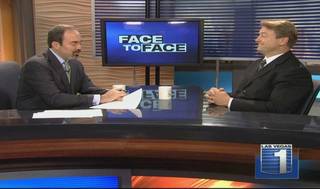Thursday, Nov. 12, 2009 | 2 a.m.
Costly Care?

Viewing video requires the latest version of Adobe's Flash Player
Sun Archives
- Close House vote on health care highlights Harry Reid’s tough task (11-11-2009)
- Why Dean Heller’s hard line on immigrants might sting later (11-8-2009)
- House poised for historic vote (11-6-2009)
- Dina Titus backing House health care plan after changes (11-4-2009)
- Their stories heard on the Hill (11-4-2009)
- Harry Reid’s next health care test: Securing 60 votes (10-28-2009)
Sun Coverage

Rep. Dean Heller
Since returning to Nevada after the House vote on health care reform, Republican Rep. Dean Heller has laid out one of his objections to the bill — call it the iPod argument.
Heller opposes the legislation’s mandate that all Americans carry health insurance.
Some people may want to buy health care, Heller said, others might want to buy an iPod. It should be their choice.
“I think all Americans ought to have access to health care,” Heller told Sun columnist Jon Ralston on the “Face to Face With Jon Ralston” TV program Tuesday.
“They ought to choose whether or not they want access,” Heller continued. “There are Americans out there who would choose, if they’re going to choose between health care and, say, an iPod — they’ll choose an iPod over their health care.
“I don’t know anywhere in the Constitution where it requires a citizen here in this country to have health care.”
Heller’s argument touches on economic and constitutional questions raised by proposed health care reform.
First, the economic front. Everyone loves free markets, except when markets fail, which is partly the situation today as health care premiums rise beyond what families can afford.
One reason health care premiums are high is something economists call externalities, unexpected costs or benefits that are not included in the price of a thing.
Externalities can be positive — your neighbors unexpectedly paint their home, boosting property values on the entire block. Or they can be negative — a factory spews pollution into the environment before it packs up and moves on.
In health care, the uninsured create negative externalities. Their emergency room visits and poor health later in life are hidden costs that jack up the price of health care for everyone else, explained Mark Thoma, an economist at the University of Oregon.
Nationwide, families pay an extra $1,100 annually for health care premiums to cover the emergency room bills of the uninsured, according to a study by Families USA, a national organization supporting health care reform.
Economists tend to believe that if all Americans are required to carry health insurance, the way drivers are required in many states to carry auto insurance, costs will be spread more equitably across the system.
“It’s a way to get people to pay their fair share,” Thoma said.
“As a society we’ve decided we’re not going to let people die because of a lack of health care,” he said, referring to the 1986 law signed by former President Ronald Reagan that prohibits hospitals from turning away emergency room patients.
But if people aren’t required to take responsibility for their own care, everyone else foots the bill.
“Your congressman would end up paying the health care costs of the neighbor, and it may be even more costly to do it that way,” Thoma said.
The health care lobby has embraced the individual mandate because it will funnel as many as 30 million uninsured Americans into health care plans, a huge increase in new customers.
Both the House and Senate bills provide subsidies to help Americans buy insurance.
But insurers also say the only way they can guarantee coverage for all — regardless of preexisting conditions or age — is to broaden the risk pool to include those who are less risky.
“The only way the market reforms work is if everybody participates,” said Robert Zirkelbach, spokesman for America’s Health Insurance Plans, the lobby for the nation’s 1,300 insurance companies.
This leads to another economic theory — the lemons problem.
Insurance is all about risk. If the young and healthy go without coverage, then insurers are constantly left covering the older and sicker — a riskier pool. As the insured require more care, those in the pool pay higher premiums, forcing some to drop out.
Imagine, Thoma explains, if only the sickest — the lemons — are left in the pool. “If you let all the healthy people drop out … you don’t have anyone to pay for the unhealthy people,” he said.
Think of it like Social Security. Ask a group of 25-year-olds if they want to see 6.2 percent of their paychecks siphoned off for their old-age pension, and surely many will say no.
But as a society we have agreed to pay into the Social Security system to take care of old folks, believing that the next generation of young people will follow suit.
The Constitution does not guarantee the right to Social Security, which leads to the Constitutional question raised by Heller. The congressman is right in that nowhere in the Constitution does it say: We the people require everyone to have health insurance.
Many federal laws are not spelled out in the Constitution, from the unpopular and abandoned 55 mph speed limit to the ongoing mandate to desegregate schools.
The Constitution establishes broad authority to provide for the common defense, promote general welfare and secure the blessings of liberty, among other tasks. Congress can pass laws. The president can sign or veto them. And the judicial branch will test their legality.
Heller believes the bill as passed by the House would be challenged in court if it were to become law. But he told Ralston he is not yet sure whether he would be party to that claim.
What is certain is the iPod argument has entered the health care debate in Nevada.

Join the Discussion:
Check this out for a full explanation of our conversion to the LiveFyre commenting system and instructions on how to sign up for an account.
Full comments policy